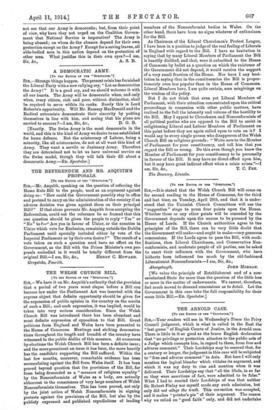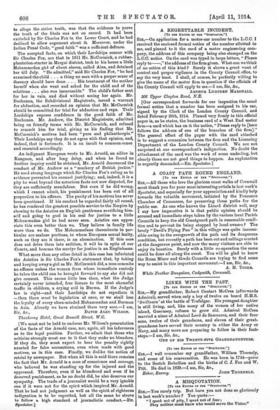THE ARNOLD CASE.
[To yrs EDITOR or TRH ..ErHoTATOR."] Sta,—Your readers will see in Wednesday's Times the Privy Council judgment, which is what is called in the East the "last guess" of English Courts of Justice, in the Arnold case. There is little in it so good as the brave English declaration that "no privilege or protection attaches to the public acts of a Judge which exempts him, in regard to them, from free and adverse comment." Their Lordships may be assured that, for a century or longer, the judgment in this case will be subjected to "free and adverse comment" in Asia. But here I will only mention the logical blunder which vitiates its argument, and which it was my duty to rise and mention when it was delivered. Their Lordships say that "all the libels, in so far as they were assertions of fact, were admitted to be false." What I had to remind their Lordships of was that neither Sir Robert Finlay nor myself made any such admission, but only did not alleys the truth. This correction was accepted, and it makes "printer's pie" of their argument. The reason why we relied on "good filth" only, and did not undertake to allege the entire truth, was that the evidence to prove the truth of the libels was not on record. It had been excluded by Sir Charles Fox in the Lower Court, and be had declined to allow argument about it. Moreover, under the Indian Penal Code, "good faith" was a sufficient defence.
The accepted facts, on which their Lordships concur with Sir Charles Fox, are that in 1911 Mr. McCormick, a rubber- plantation-starter in Mergai district, took to his house a little Mohammedan girl of about eleven, called Aina, and detained her till July. "He admitted," said Sir Charles Fox, "he had examined the child . . . a thing no man with a proper sense of decency should have done. . . . His treatment of the mother herself when she went and asked for the child and of the relations . . . also was inexcusable." The child's father sent for her in vain, and died without seeing her again. Mr. Buchanan, the Subdivisional Magistrate, issued a warrant for abduction, and recorded an opinion that Mr. McCormick should be committed for trial for abduction and rape. Their Lordships express confidence in the good faith of Mr. Buchanan. Mr. Andrew, the District Magistrate, admitted being on friendly terms with Mr. McCormick, and refused to commit him for trial, giving as his finding that Mr. McCormick's motives had been "pure and philanthropic." Their Lordships say they do not agree with that opinion, and, indeed, that is fortunate. It is an insult to common.sense. and resented accordingly.
An indignant European wrote to Mr. Arnold, an editor in Rangoon, and after long delay, and when be found no further inquiry could be obtained, Mr. Arnold denounced the conduct of Mr. Andrew as a "mockery of British justice." He used strong language which Sir Charles Fox's ruling as to evidence prevented his counsel justifying; and, indeed, it is a pity he went beyond the notorious' facts not now disputed, for they are sufficiently scandalous. But even if he did wrong, which I cannot admit, his punishment has been out of all proportion to his offence. The purity of his motives has never been questioned. If his conduct be regarded fairly all round, he has rendered the greatest possible service to the Empire by showing to the Asiatics an English gentleman sacrificing him. self and going to gaol in his zeal for justice to a little Mohammedan girl he bad never seen. .Aaiatics can appre- ciate this even better than we. They believe in family life more than we do. The Mohammedans thereabouts in par- ticular are zealous puritans, to whom European sexual laxity, such as they see it there, is an abomination. If this ease does not drive them into sedition, it will be in spite of our Courts, and because the martyr for justice is an Englishman.
What more than any other detail in this case has infuriated the Asiatics is Sir Charles Fox's statement that, by taking and keeping away a girl as Mr. McCormick did, a man commits no offence unless the woman from whose immediate custody he takes the child can be brought forward to say she did not give consent. This seems little less than, what the Judge certainly never intended, free licence to the most shameful traffic in children, a crying evil in Burma. If the Judge's law is right—and their Lordships do not repudiate it —then there must be legislation at once, or we shall lose the loyalty of every clean-minded Mohammedan and Berman in Asia. Already we have strained them very sore.—I am,
Thackeray Hotel, Great Russell Street, W.C.
[We must not be held to endorse Mr. Wilson's presentation of the facts of the Arnold case, nor, again, all his inferences as to the legal position. Further, we admit that those who criticize strongly must see to it that they make no blunders. If they do, they must expect to bear the penalty rightly exacted for false accusations, even when made with good motives, as in this case. Finally, we dislike the notion of retrial by newspaper. But when all this is said there remains the fact that Mr. Arnold is a man of conscience and courage, who believed he was standing up for the injured and the oppressed. Therefore, even if he blundered and even if he deserved punishment, as he no doubt did, he also deserves our sympathy. The trade of a journalist would be a very ignoble one if it were not for the spirit which inspired Mr. Arnold. That he had not judgment as well as the spirit of righteous indignation is to be regretted, but all the same he strove to follow a high standard of journalistic conduct—ED.
Bpectator.)







































 Previous page
Previous page